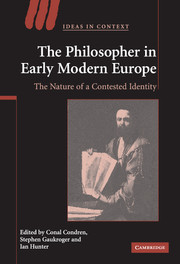Book contents
- Frontmatter
- Contents
- List of contributors
- Acknowledgements
- Introduction
- 1 The persona of the natural philosopher
- 2 The university philosopher in early modern Germany
- 3 The persona of the philosopher and the rhetorics of office in early modern England
- 4 From Sir Thomas More to Robert Burton: the laughing philosopher in the early modern period
- 5 Hobbes, the universities and the history of philosophy
- 6 The judicial persona in historical context: the case of Matthew Hale
- 7 Persona and office: Althusius on the formation of magistrates and councillors
- 8 Descartes as sage: spiritual askesis in Cartesian philosophy
- 9 The natural philosopher and the virtues
- 10 Fictions of a feminine philosophical persona: Christine de Pizan, Margaret Cavendish and philosophia lost
- 11 John Locke and polite philosophy
- Index
- IDEAS IN CONTEXT
9 - The natural philosopher and the virtues
Published online by Cambridge University Press: 06 November 2009
- Frontmatter
- Contents
- List of contributors
- Acknowledgements
- Introduction
- 1 The persona of the natural philosopher
- 2 The university philosopher in early modern Germany
- 3 The persona of the philosopher and the rhetorics of office in early modern England
- 4 From Sir Thomas More to Robert Burton: the laughing philosopher in the early modern period
- 5 Hobbes, the universities and the history of philosophy
- 6 The judicial persona in historical context: the case of Matthew Hale
- 7 Persona and office: Althusius on the formation of magistrates and councillors
- 8 Descartes as sage: spiritual askesis in Cartesian philosophy
- 9 The natural philosopher and the virtues
- 10 Fictions of a feminine philosophical persona: Christine de Pizan, Margaret Cavendish and philosophia lost
- 11 John Locke and polite philosophy
- Index
- IDEAS IN CONTEXT
Summary
One of the distinctive features of modern science – indeed some would say its defining characteristic – is its reliance on a set of clearly defined methodological prescriptions, known popularly as ‘the scientific method’. The much-vaunted objectivity of science is vested in the observance of this universal method and, despite the reservations of critics concerning the nature and existence of this supposedly unifying feature of the natural sciences, modern science draws much of its social legitimacy from the perceived reliability of its methods. Central to the prestige of scientific methods is their insensitivity to the personal qualities of those who employ them. The putative universality and objectivity of science are attributed to the fact that the production of dependable knowledge does not rely on its practitioners sharing a common set of personal characteristics, but rather on their observance of a common set of procedures. In this respect modern science differs radically from its medieval and early modern predecessor, natural philosophy. Natural philosophers, engaged as they were in a branch of philosophy, were expected to conform to traditional models of the philosophical persona, in which the moral characteristics of the individual were the pledge of the truth of what they knew. That said, the beginnings of a shift of focus from persons to methods was already in train in the seventeenth century.
- Type
- Chapter
- Information
- The Philosopher in Early Modern EuropeThe Nature of a Contested Identity, pp. 202 - 228Publisher: Cambridge University PressPrint publication year: 2006
- 6
- Cited by



